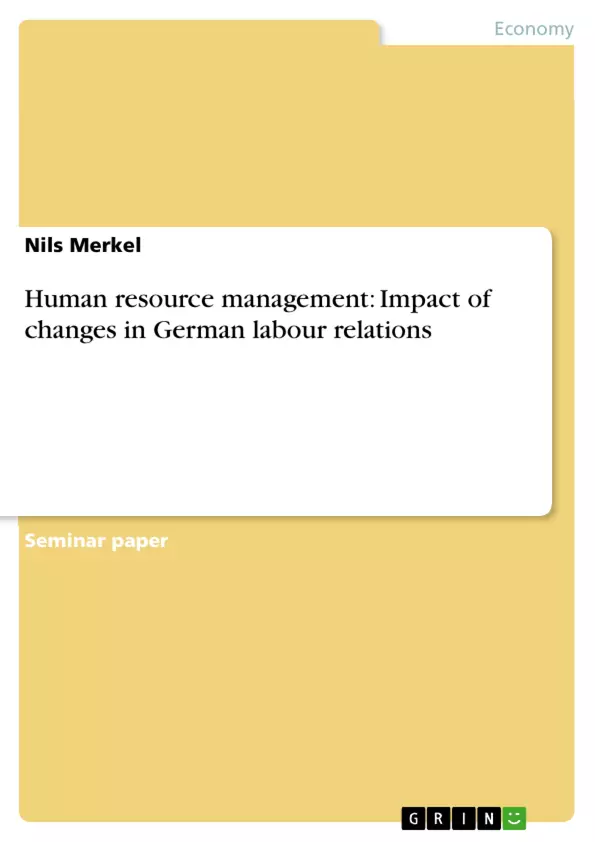In this paper I will first of all give an overview about the general labour relations between employers and employees and the intermediary institutions especially for Germany. Furthermore reasons of the radical changes in this relation will be worked out in chapter 3. The main focus is set on the high unemployment rate and its impacts concerning the position of the employers. Finally there will be a discussion how these changes will impact upon the function of Human Resource Departments in large and medium size corporations and a statement about the future development.
Inhaltsverzeichnis (Table of Contents)
- Introduction
- General Labour Relations in Germany
- Labour union “Gewerkschaft”
- Works Council “Betriebsrat”
- Employers' association “Arbeitgeberverband”
- Present Situation in Germany - Problems and Changes
- Decreasing importance of the labour union
- The “Ich AG”
- Temporary employment agencies and private labour agencies
- Works Councils
- Relocation abroad
- Rescue Companies and “5000*5000”
- Consequences for Human Resource Departments
- Opinion about the future
Zielsetzung und Themenschwerpunkte (Objectives and Key Themes)
This paper provides an overview of general labour relations in Germany, focusing specifically on the changes and challenges facing the country's employment landscape. It examines the historical context of labour unions, works councils, and employers' associations, and delves into the present situation, highlighting the impact of high unemployment and the rise of new employment models. The paper then explores the consequences of these changes for human resource departments and offers an opinion on future developments.
- Changes in German labour relations
- Impact of high unemployment on employer-employee relationships
- Role and function of labour unions, works councils, and employers' associations
- Rise of flexible and temporary employment
- Implications for human resource management in large and medium-sized corporations
Zusammenfassung der Kapitel (Chapter Summaries)
- Introduction: Provides an overview of the paper's scope and objectives, focusing on the changes in German labour relations, particularly the role of unemployment.
- General Labour Relations in Germany: Introduces the key actors in German labour relations: labour unions, works councils, and employers' associations. It defines their roles and functions within the German employment system.
- Present Situation in Germany - Problems and Changes: Examines the current state of German labour relations, highlighting the decreasing importance of traditional labour unions, the rise of self-employment ("Ich AG"), and the increasing use of temporary employment agencies. It also discusses the role of works councils and the impact of relocation and rescue companies on the labour market.
- Consequences for Human Resource Departments: Explores the implications of the changes in German labour relations for human resource departments in large and medium-sized corporations, considering challenges and opportunities.
Schlüsselwörter (Keywords)
This paper focuses on the changing landscape of German labour relations, including themes of labour unions, works councils, employers' associations, unemployment, flexible employment, temporary employment agencies, human resource management, and future trends in the German employment system.
Frequently Asked Questions
What are the key institutions in German labour relations?
The main intermediary institutions are labour unions (Gewerkschaften), works councils (Betriebsräte), and employers' associations (Arbeitgeberverbände).
How has high unemployment affected German labour relations?
High unemployment has shifted power towards employers and led to radical changes, including the rise of temporary employment and a decrease in union influence.
What is the role of a Works Council (Betriebsrat)?
A Works Council represents employees' interests at the company level, participating in decisions regarding working conditions and personnel changes.
What are "Ich AGs" and temporary agencies in the German market?
They represent newer, more flexible employment models that emerged as a response to labour market problems, often leading to more precarious work conditions.
How do these changes impact Human Resource Departments?
HR departments in large and medium corporations must adapt to more complex legal frameworks and a more fragmented workforce due to outsourcing and flexible contracts.
- Arbeit zitieren
- Nils Merkel (Autor:in), 2005, Human resource management: Impact of changes in German labour relations, München, GRIN Verlag, https://www.grin.com/document/56782



